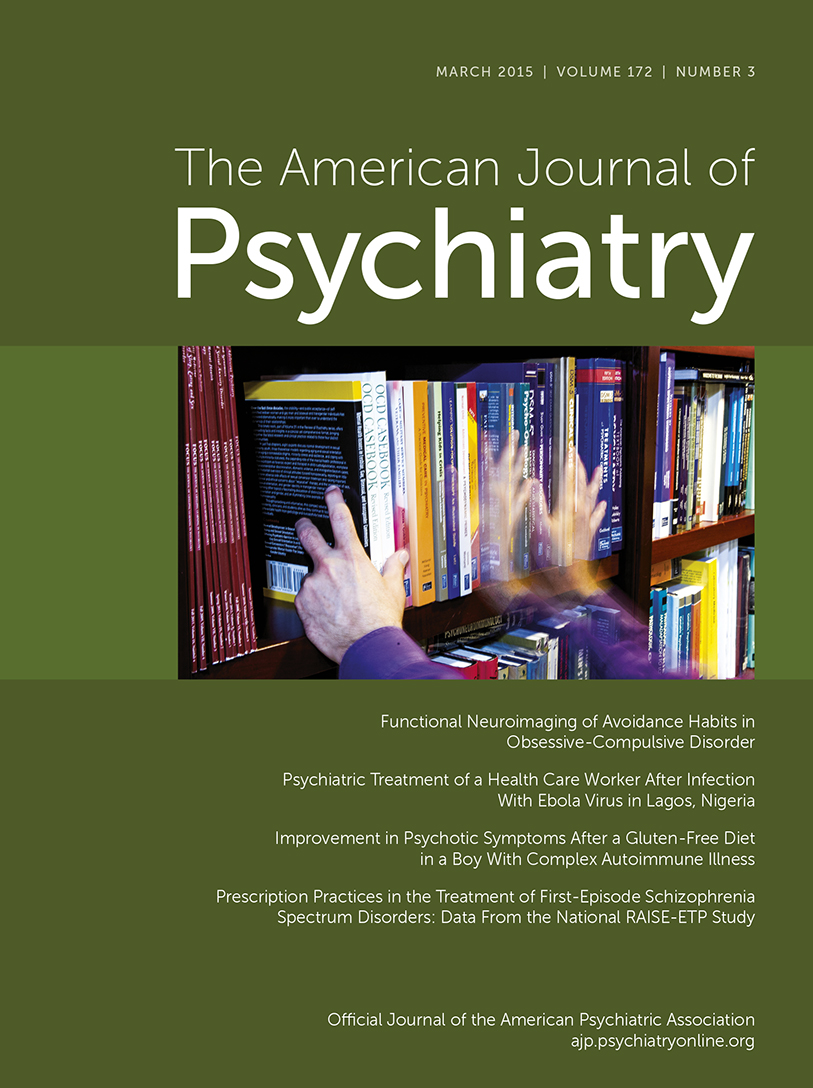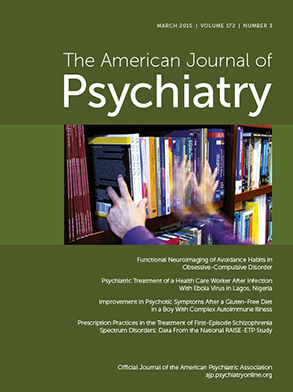Case Presentation
At age 8, “Chris,” a Caucasian boy, experienced intermittent auditory and visual hallucinations, but without bizarre behaviors or much deterioration in functioning. At age 15, he developed a depressed mood, started talking to himself, and became socially withdrawn, and his academic performance declined. He was hospitalized and diagnosed as having major depressive disorder with psychotic features. MRI and EEG showed no abnormalities. Treatment with escitalopram (10 mg/day) and aripiprazole (5 mg/day) had little effect. Several weeks after discharge, he was admitted for a second time with the same diagnosis; a third admission, again with the same diagnosis, occurred several months after that. At age 16, Chris developed visual and auditory hallucinations with homicidal ideations. He cut himself superficially following the command of voice hallucinations, and he was hospitalized again, with the diagnosis changed to schizophrenia, paranoid type.
During this inpatient stay, he was treated with venlafaxine (150 mg/day) and risperidone (1.5 mg/day). During the same admission, a blood test showed the presence of antinuclear antibodies (ANAs), but the patient had no symptoms of any autoimmune disease. In the meantime, he was also receiving clindamycin/benzoyl peroxide and adapaline gels and minocycline for acne and fluticasone nasal spray and albuterol for asthma. An allergy to gluten was demonstrated by an assay (Accessa Labs) that showed only IgE antigluten antibodies. Chris’s parents reported that he developed an allergy to peanuts and soy at about the same time. Gluten was removed from his diet at the suggestion of the mother, a licensed dietitian. After the dietary change, the intensity of Chris’s auditory hallucinations declined dramatically and the violent element diminished, and he was discharged after 9 weeks.
During the next 2 years, Chris remained on a gluten-free diet, which he and his family associated with the disappearance of his psychotic symptoms. Sensitivity to gluten was demonstrated by an assay (Metametrix Clinical Laboratory) of a stool sample that yielded a value of 10.6 mg/dL of IgA antigliadin antibodies, in the top quintile of the reference range. The dosage of risperidone was tapered to 0.5 mg/day, and no auditory or visual hallucinations occurred, although when the dosage was lowered to 0.25 mg/day, Chris reported feeling anxious, and the dosage was returned to 0.5 mg/day for a time. Eventually the risperidone was discontinued completely. Chris was able to return to school, where his academic performance was normal and he joined several athletic teams.
At age 16, after his hospital stay, Chris lost his hearing suddenly and was fitted with a hearing aid. His ANA level was high, and the diagnosis of autoimmune inner ear disease was made. He was treated with prednisone and then methotrexate over a 2-month period. Despite his hearing loss, he has maintained a high level of functioning, including learning to read lips, and he has continued to play competitive sports.
Both of Chris’s parents have a history of seasonal affective disorder, and two grandparents had experienced bouts of depression. The father had hypothyroidism, and the father’s aunt had Crohn’s disease. The mother’s brother had hearing loss with ANAs, and the mother’s cousin had systemic lupus erythematosus. The parents were 32 years old when Chris was born, and the pregnancy and birth were unremarkable, with no complications. He is the second son. Starting in infancy, he had recurrent bouts of otitis media, which were treated with tympanoplasty and continued until age 12. At 3 months, he was diagnosed with eosinophilic gastritis.
Discussion
Schizophrenia is currently thought to be heterogeneous in its etiology as well as its symptomatology, with a range of subtypes (
1). The illness was originally assumed to have a degenerative course, but there have always been cases of recovery in persons originally diagnosed as having schizophrenia (
2), a variation that may be associated with etiologic subtypes. There is a wide range of possible etiologic subtypes, including syndromes relevant to immune dysfunction that may be associated with infections (
3), with autoimmune diseases (
4), or with the combination of these two mechanisms (
5). A candidate autoimmune condition is celiac disease (
6), for which there is a substantial clinical, epidemiologic, and experimental scientific literature (
7) extending back to the work of Graff and Handford in 1961 (
8) and the work of Dohan in 1970 (
9). There have been case reports of dramatic recovery from schizophrenia associated with implementation of a gluten-free diet (
10–
12). The results of clinical trials involving gluten-free diets are mixed, however, perhaps because of the etiologic heterogeneity of schizophrenia (
7,
13). It is possible that the immunological effects of gluten in schizophrenia are not limited to celiac disease, but also include various forms of nonceliac immune-mediated gluten sensitivity (
14,
15). It has been shown repeatedly that persons with schizophrenia have higher immune-mediated gluten sensitivity that is not connected to celiac disease (
16), as compared with the general population.
This case presents a variety of immunological abnormalities in the patient and his family that may have a relationship to his psychosis. The father’s hypothyroidism may be particularly relevant, since hypothyroidism is associated with a higher risk of psychosis in the offspring as well as in the proband (
4,
17–
19). The patient’s recurrent otitis media is also noteworthy, since otitis media during childhood has been associated with a higher risk of schizophrenia (
20). The patient’s early eosinophilic gastritis and his IgE antibodies to gluten suggest the possibility of a predisposition to an IgE-mediated activation of the immune system. It is not clear from the literature whether high ANA levels are uniformly associated with a diagnosis of schizophrenia, as there are several reports of no differences between cases and controls (
21).
We believe that the loss of hearing in this patient is attributable to a different immune mechanism than the allergic reaction to gluten that is potentially related to his psychosis. Indeed, the patient’s maternal uncle had hearing loss and was positive for ANAs, but unlike the patient, he did not have psychosis. In favor of this hypothesis is the fact that the patient’s schizophrenia symptoms remitted after he started a gluten-free diet, while his autoimmune inner ear disease, which may already have been triggered at the time of the initial ANAs while the patient was eating gluten, continued to progress. The presence of only IgE antibodies to gluten in the patient raises the possibility that his psychotic symptoms could be associated not only with the presence of antigliadin (AGA) and/or tissue transglutaminase antibodies (as currently reported in the literature) but also with IgE antibodies.
The remission of psychotic symptoms in this patient has been associated with maintenance of the gluten-free diet, but it is also possible that the minocycline he was taking for acne contributed to his recovery, since this antibiotic has been associated with improvement of schizophrenia symptoms in several studies (
22,
23). However, both risperidone and minocycline have since been discontinued. This leaves the distinct possibility that the withdrawal of gluten from the diet was the crucial factor in the patient’s recovery, which fits with our previously reported finding (
24) that improvements in symptoms begin as soon as 2 weeks after a gluten-free diet is started in persons with schizophrenia who have antigliadin antibodies. However, the basis for the response of the patient’s schizophrenia symptoms to a gluten-free diet is not completely clear. An immune-mediated reaction to gluten could trigger a neuroinflammatory process, with associated impairment of the permeability of the blood-brain barrier. We recently reported an increased prevalence of antibodies for transglutaminase 6, specifically expressed in the brain, in schizophrenia patients who were positive for AGA antibodies (
25). We described the findings as a marker of neuroinflammation in gluten-sensitive schizophrenia patients. Similarly, the allergic reaction to gluten in the patient described here could result in a neuroinflammatory process.
Regardless of the exact mechanism involved, the marked improvement in this patient’s schizophrenia symptoms after implementation of a gluten-free diet and the multiple similar cases in the literature (
10–
12,
24) underscore the need for further research on the role of diet in schizophrenia, as well as the potential importance of a personal or family history of autoimmune diseases in identifying patients who may be responsive to dietary treatment.

